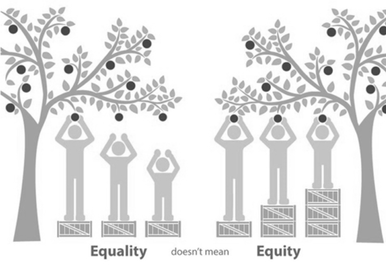|
If you are a professional or a writer who is passionate about health, racial, and social equity, consider contributing to our blog! Visit our Volunteer page to learn more. |
|
by Sarah Carlson
One common form of implicit bias in health and social services is the differential treatment of male and female-presenting patients. Generally speaking, most people tend to make unconscious associations regarding masculinity and femininity, and these assumptions can impact the ways in which individuals understand and treat patients. In healthcare settings, widespread assumptions about men and women, such as the idea that men are more resilient and that women are more likely to express pain, might be detrimental and lead to inadequate treatment by healthcare professionals. As a result of such biases, patient needs can be overlooked (2). At times, even the criteria for some illnesses are created through a gendered-lens, potentially contributing to the inequitable treatment of men versus women. Certain diseases, such as fibromyalgia and anxiety neurosis, both chronic conditions, are more common in women and also taken less seriously than other illnesses (3). Gender-related implicit bias also often leads to women and girls not receiving adequate treatment. This kind of bias also impacts men and boys. For example, as male patients are perceived as more resilient to pain and suffering, healthcare professionals may push them to engage in behaviors such as physical activity when they are not in adequate enough health conditions to do so (2). Additionally, mental health’s struggles among men are often overlooked due to similar assumptions regarding strength and resilience (4).
It is recognized that men and women in the United States face different health outcomes. For instance, while women report higher rates of mental illness, men of all age groups are at a higher risk for suicide than women (5). Another example of male and female health inequities is the fact that while men across the globe die at younger ages than women, women tend to have higher morbidity rates and decreased quality of life (6). When coupled with other root causes of inequities such as racism and poverty, gender-related health inequities can be further compounded. Additionally, this does not even begin to consider the experiences of gender non-binary individuals, who do not identify as male or female. While I recognize that it is difficult to truly get to the root of gender inequities, considering their historical basis and deep socio-cultural significance, it is important that those of us who work in health and social professions are honest about understanding the common binary cisgender biases we carry. We need to consciously recognize that men are not always stoic and resilient whilst women rarely are exaggerating their experiences. Even though implicit bias is deeply ingrained, we can still do our best to see our patients as their own selves, not simply through the lens of their gender. Picture credit: https://www.pexels.com/ References 1) Implicit Bias. https://perception.org/research/implicit-bias/. Published 2017. Accessed January 15th, 2021. 2) Anke S, Ida G, Erik E, Gunnel H. "Brave Men" and "Emotional Women": A Theory-Guided Literature Review on Gender Bias in Health Care and Gendered Norms towards Patients with Chronic Pain. https://pubmed.ncbi.nlm.nih.gov/29682130/. Published 2018. Accessed January 15th, 2021. 3) Dag A, Steinar W. Do diseases have a prestige hierarchy? A survey among physicians and medical students. https://pubmed.ncbi.nlm.nih.gov/17850944/. Published 2008. Accessed January 15th, 2021. 4) Dena S, Dawne M, Marta E. Reviewing the Assumptions About Men’s Mental Health: An Exploration of the Gender Binary. https://journals.sagepub.com/doi/full/10.1177/1557988316630953. Published 2016. Accessed January 17th, 2021. 5) America’s Health Rankings. Health Disparities by Gender. https://www.healthequityinitiative.org/blog/looking-at-how-the-covid-19-pandemic-has-amplified-existing-health-inequities. Published 2019. Accessed January 17th, 2021. 6) Esteban O, Diana B. Why do women live longer than men? https://ourworldindata.org/why-do-women-live-longer-than-men. Published 2018. Accessed January 17th, 2021. About the author Sarah M. Carlson was the Summer-Fall 2020 Communication and Social Media Intern at Health Equity Initiative. She is currently an MPH candidate at The College of New Jersey with a specialization in Health Communications. Some of her passions include health outreach and the bridging of social disparities among marginalized demographics.
1 Comment
|
Archives
June 2023
CategoriesEditors:
Renata Schiavo, PhD, MA, CCL Alka Mansukhani, PhD, MS Radhika Ramesh, MA Guest posts are by invitation only. |




 RSS Feed
RSS Feed
